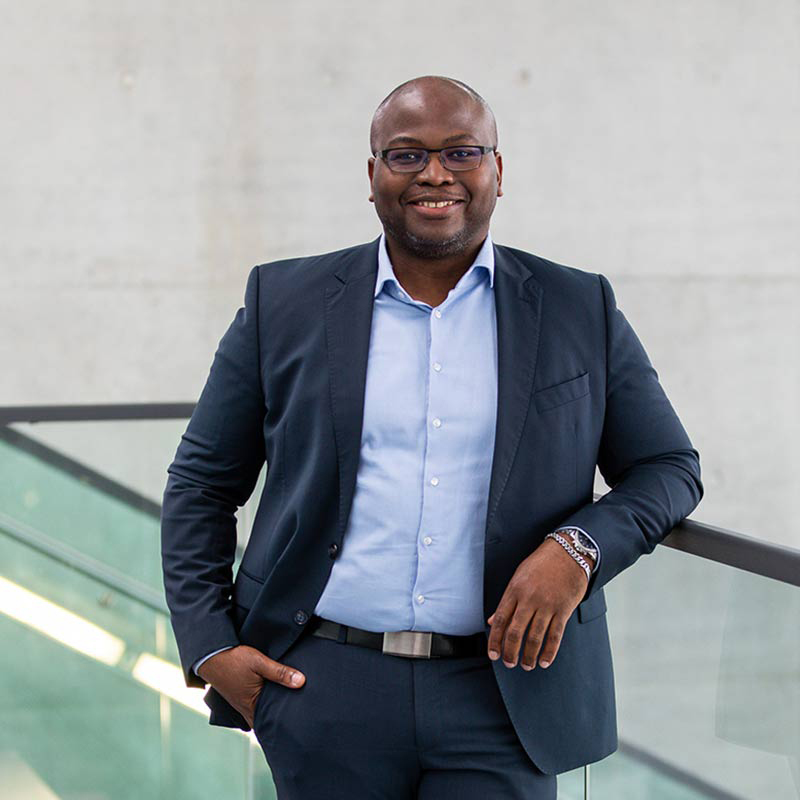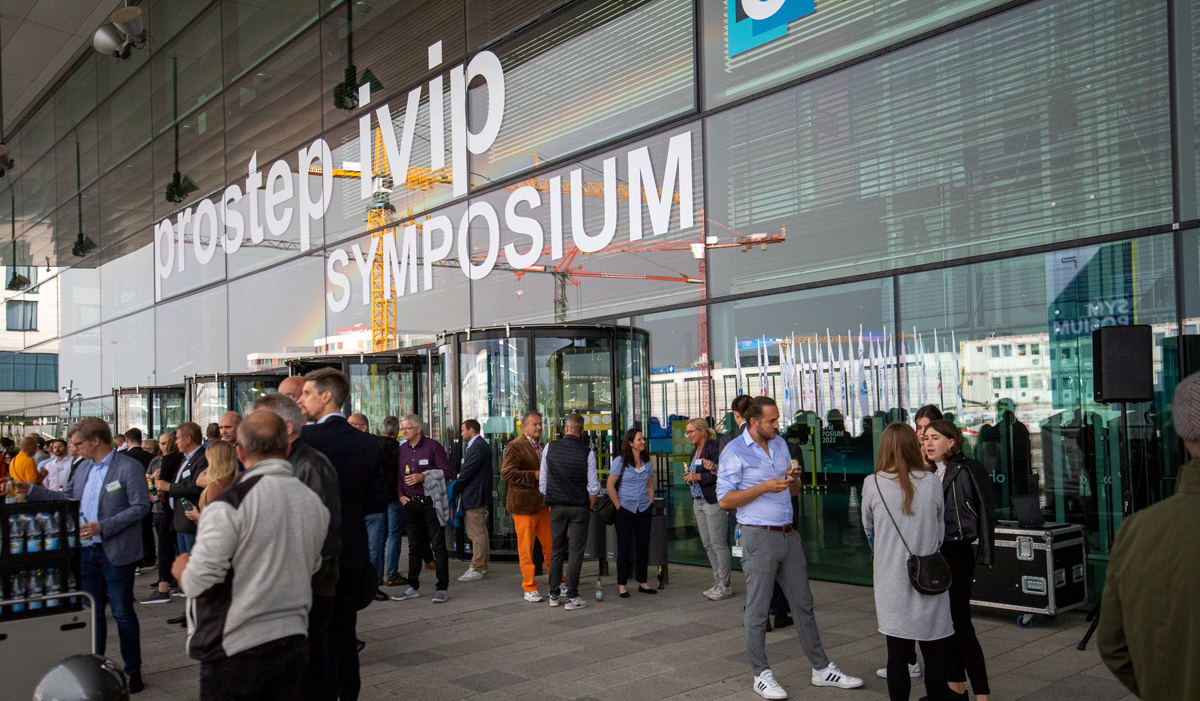A conversation with Dr. Alain Pfouga
For the first time after more than two years of pandemic, the prostep ivip Symposium took place again as a face-to-face event at the beginning of June. In this interview, Managing Director Dr. Alain Pfouga explains why the event was so successful again, what importance the face-to-face meeting has for the community, and what strategic changes have been put on track in Stuttgart.
Ulrich Sendler: Dr. Pfouga, let’s start with the bare figures: What was going on at the ICS in Stuttgart on June 8 and 9?
Dr. Alain Pfouga: With 520 participants, we were more than satisfied with the result of our 25th anniversary, considering the date was moved to the Whitsun vacations. Organizers of other events who had invited again for the first time after the Covid break and also our participants confirmed this to us. The proportion of international participants was as high as we are used to from the past. Well-attended 46 presentations with a total of 95 speakers in three parallel sessions, four completely booked workshops and 35 exhibitors – these figures are no different from those of the last successful physical event three years ago.
Ulrich Sendler: It was not – not even partially – a hybrid conference. Was that the right decision?
Dr. Alain Pfouga: Absolutely! It was very clear to us that the personal meeting of so many experts and decision-makers from industry, IT and research is of the utmost importance to our community. This is something they only get with us. It was very important to us to revive exactly this character of the event. In addition to this general justification, it is also true that it has never been more important than at present to exchange ideas as intensively as possible. Not because of the pandemic and its consequences, but because the industry is undergoing a transformation that no company or industry can implement alone.
I’m just mentioning new aspects such as electromobility and the role of software in the product, which are driven by sustainability, digitalization or new market and customer needs. The experiences of others have perhaps never been as valuable as they are right now. Because almost everyone is taking a different starting point and path for their transformation.
Ulrich Sendler: So what exactly is the difference that the prostep ivip association has identified in the industry right now?
Dr. Alain Pfouga: Over the past 30 years, we have worked hard to put method and process excellence in the product development process on a broad industrial basis by means of standardization, digitalization and software support. In engineering, in production, in sales, in maintenance – for every step over the entire life cycle of products.
Now we are seeing the products themselves becoming more digital and enabling new, data-driven business models. The software built into them is becoming increasingly important to the use and value of the products. This requires a complete rethink because the traditional view of enterprise architecture no longer meets the requirements of a world of systems of systems and product platforms. Take CARIAD at Volkswagen or the reintegration of software competencies at numerous OEMs – just to pick out the developments at automotive manufacturers – companies have realized that software development for their products absolutely belongs to the core competence in their houses. And this is not only true for automotive.
By the way, during the symposium we gave the starting signal for a prostep Circle of Excellence. It is intended to help companies at C-level to understand the change that is taking place and to exchange views on necessary measures. This change is so profound that we initiated a strategic discussion in the association board to reflect the paradigm shift that the industrial, digital transformation will bring to prostep ivip. On the occasion of the symposium, we made two important decisions and set their implementation in motion. One is the expansion of our association goals. We want to sharpen our vision of digitalization and focus our work more on topics such as software in the product, virtual homologation and systems and data engineering. At the same time, we are pushing ahead with internationalization, because many topics cannot be solved locally. The second decision was to expand the Executive Board from four to six members in order to drive forward precisely this realignment. Thomas Kamla was elected for the topics of software in the product and systems engineering, and as Senior Director he reports directly to the VW Board of Management for Development. Jens Poggenburg , Executive Vice President at AVL, was elected as the new representative of the automotive suppliers on the Board and brings with him a great deal of expertise in the areas of practical application of model-based development and digitalization. And for internationalization, we were able to win Tomohiko Adachi from Mazda Motor Corporation in Japan.
Ulrich Sendler: These are indeed serious decisions. Does this mean that the topic of PLM, which has been more or less the umbrella topic of the symposium, will take a back seat in the future?
Dr. Alain Pfouga: PLM remains a central topic for our members. It is something like the basis with enormous docking capability to topics that we must address even more strongly.
How can the V-model and the three- to four-year development cycles in hardware work together with the daily cycles of agile software development? How do we bring the different expertise together?
Or take simulation: Without PLM and a digital twin of the product, it is not enough to demonstrate the potential of virtual simulation.
For example, have we already reached the point where we can recommend simulation to legislators as a method for homologation certification? How does the handshake of all partners work, the harmonization of the entire value chain, if simulation is used extensively as a substitute for prototypes? And another thought: How can we enable people in the industry to think in a kind of data-driven way, helping them to prepare data from the product and from the processes in such a way that it is useful for analytical purposes or for training AI systems? That’s where PLM, aspects of digital twins and MBSE play in.
The main sponsors of the symposium, Contact Software and Mitsubishi Electric, emphasized both AI and the connection of PLM with IT worlds (IoT) in their keynotes. And in doing so, they addressed points that came up again and again at many points during the two days of the trade congress.

Karl Heinz Zachries, Managing Director of one of the main sponsors, Contact Software (Photo prostep ivip e.V. / Ralf Kopp)
Ulrich Sendler: You look back with great enthusiasm on the symposium, which was again heldface-to-face. What feedback have the participants given you?
Dr. Alain Pfouga: Not everything has been evaluated in detail yet, but what I already know tells me that about 95% had both thumbs up in their evaluation. For the implementation, for the presentations and workshops, for the topics covered. And that with our nevertheless rather cautious expectation attitude. After all, we had to take an unfavorable date. And it was by no means clear how the pandemic would affect the break of all habits. The extremely positive response was really an enormous confirmation.
Ulrich Sendler: What are the association’s plans for the 2023 symposium?
Dr. Alain Pfouga: It will take place on May 3 and 4, so again in our usual time. The motto will be announced soon on our homepage. The main sponsors will be Volkswagen and Siemens. In 2023 we will meet again in the ICS. Next to an airport, with enough hotel rooms on site and with the possibility to scale up to 1,000 participants.



